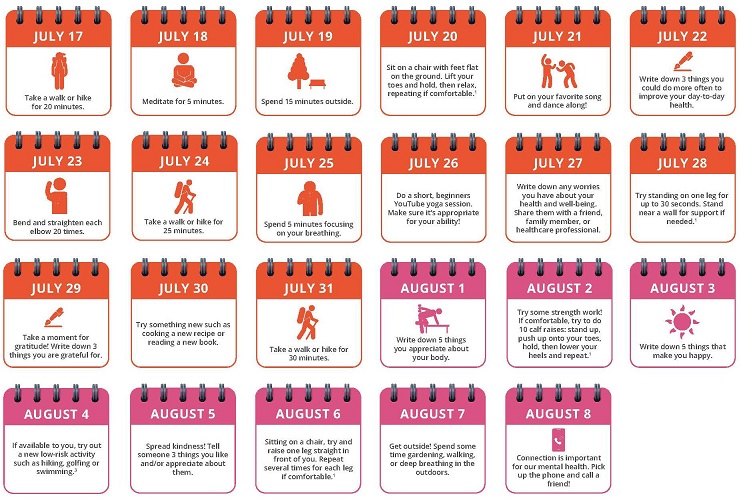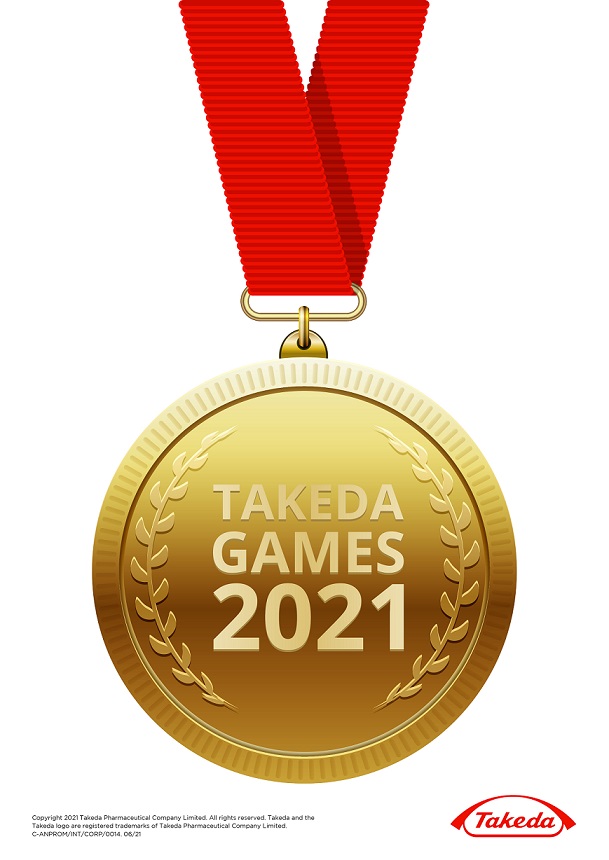
#TakedaGames: A three-week program of physical and mental exercises for patients with bleeding disorders1
Living an active and fulfilled life with a bleeding disorder is a reality for many people today. In the past, sports and physical activity were discouraged for individuals with a bleeding disorder, such as hemophilia. Now that treatment options are widely available, both children and adults are encouraged to partake in physical activities, as recommended by the World Federation for Hemophilia (WFH) and the National Hemophilia Foundation (NHF).1,2,3 While appropriate physical activity is recommended, patients should always consult their healthcare provider (HCP) before starting any new or modified exercise routines.
In fact, there are effective methods of how those living with bleeding disorders can participate in an active, healthy lifestyle. Certain low-risk activities and types of exercises can help maintain a healthy weight, strengthen muscles around the joints, and improve emotional health, too.2 These benefits of physical activity are felt in those living with bleeding disorders, when done appropriately. Not everyone can be an athlete, but we can all be inspired to be our best selves.
To help inspire the community to focus on improving well-being, Takeda launched the Takeda Games in conjunction with the 2021 International Society on Thrombosis and Haemostasis (ISTH) annual congress. The #TakedaGames program is a three-week challenge consisting of low-risk1, physical and mental wellness challenges suitable for the bleeding disorders community, and we want you to participate!
Participate in the Takeda Games: Customize Your Exercise Routine
When choosing an activity or exercise, you may want to take into consideration your history of bleeds, general body build, and the condition of your joints. Your healthcare professional (HCP) or physical therapist can help develop an exercise regimen that's best for you.2
The #TakedaGames calendar includes several types of exercises to help you get active. There are many exercises that may be appropriate for you. It also may be possible to modify many of the exercises described within the “challenge calendar” if you’re nervous about trying them. Remember to consult with your HCP before beginning any exercise routine.2
Emotional Wellbeing is Just as Important
While there may be a lot of focus on your physical health when you have a bleeding disorder, your emotional health is just as important. Emotions play a key role in your overall quality of life and when you have a bleeding disorder you may experience a bigger emotional toll than those who don't.4
While negative emotions are a normal part of daily life for everyone, it’s important to reach out and talk to others about how you are feeling. Other strategies, such as meditation or journaling, can also manage emotional health.5 The #TakedaGames considers the overall health of an individual, as a comprehensive wellbeing approach to one’s health can build individual autonomy and resilience – thereby improving one’s quality of life while living with a chronic condition.6
Build Healthy Habits and Earn a Virtual Medal
Not many people are able to participate, much less win, organized competitions, but everyone is able to make their wellbeing a priority. If you’ve committed to healthy habits, give yourself a gold a medal this summer.
At Takeda, we are dedicated more than ever in our efforts to offer a wide range of programs and support to help patients throughout their treatment journey.
Follow the #TakedaGames on Twitter to learn more. Make sure to share the virtual medal with other Takeda Games participants on Twitter using the #TakedaGames!
+++
References
- Alice Anderson; National Hemophilia Foundation. Playing it safe: bleeding disorders, sports and exercise. https://stepsforliving.hemophilia.org/sites/default/files/playing-it-safe.pdf#overlay-context=resources/physical-activity. Published 2017. Accessed May 19, 2021.
- Srivastava A, et al. WFH Guidelines for the Management of Hemophilia, 3rd edition. Haemophilia 2020; 26(Suppl 6):1–158.
- Goto M, Takedani H, Yokota K, Haga N. Strategies to encourage physical activity in patients with hemophilia to improve quality of life. J Blood Med. 2016;7:85-98. Accessed September 4, 2019.
- Emotional health. Steps for Living website. https://stepsforliving.hemophilia.org/step-up/maintaining-a-healthy-body/emotional-health. Accessed August 27, 2019.
- Smyth J, Johnson J, Auer B, Lehman E, Talamo G, Sciamanna C. Online Positive Affect Journaling in the Improvement of Mental Distress and Well-Being in General Medical Patients With Elevated Anxiety Symptoms: A Preliminary Randomized Controlled Trial. JMIR Ment Health 2018;5(4):e11290 URL: https://mental.jmir.org/2018/4/e11290 DOI: 10.2196/11290
- SAMHSA. (2016). CREATING A HEALTHIER LIFE A STEP-BY-STEP GUIDE TO WELLNES. https://store.samhsa.gov/sites/default/files/d7/priv/sma16-4958.pdf
Copyright © Takeda Pharmaceutical Company Limited. All rights reserved. Takeda and the Takeda logo are registered trademarks of Takeda Pharmaceutical Company limited.

